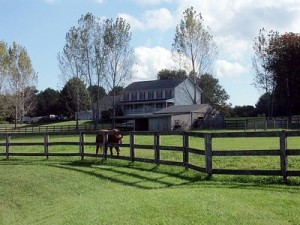Ways to be a Good Equestrian Neighbor
Many of us remember the days when farms were surrounded by acres upon acres of land. Yet, when driving around today, we rarely see those large farms with rolling pastures. So what happened to those farms that were built decades ago? Well, due to population growth and urbanization, they became surrounded by neighborhoods and urban land developments. Often these neighborhoods back up to the large farms and these neighbors get their first experience living near a horse farm.
Many times, neighbors have only ridden a horse on a vacation trail ride or pet one at a petting zoo. They struggle to relate to the farm lifestyle and are not adjusted to the smells and sounds that come with a horse farm.

Non-horsey neighbors hope to have tall, green pastures outside their homes with a few horses peacefully grazing.
Non-horsey neighbors hope to have tall, green pastures outside their homes with a few horses peacefully grazing. So when our horses tear up the fields on muddy mornings, overgraze, and poop near the neighbor’s fence, often neighbors choose to complain about the “eye soar”. Therefore, it can be a good idea to have a sacrifice pastures, especially during the winter months. Not only does it please your neighbors but it’s better for your pastures too.
Remember to operate machinery between normal working hours. While there is something fantastic about a freshly dragged arena, powering up the tractor before 6am is not the best idea. Try to operate all machinery between 8am and 9pm.
Some states require a manure plan for horses and other livestock. Whether your state requires it or not, manure plans are a good idea. Some states regulate that manure be picked up every day in highly confined areas. Other states have no regulation at all. Either way, manure should be stored away from any neighboring properties and kept to a minimum.
General maintenance of the farm is a large part of being a good neighbor. Monitoring the level of weeds in pastures and weed whacking along the fence line can make a huge difference. Having a property that is well-kept shows that you care about its longevity and appearance.
Farm management is crucial to containing the smells and sounds that come with operating a barn. The care of your property will translate into your relationship with your neighbors. And happy neighbors always makes running a barn easier.
By Anna Hellman
-
Articles
- March 2023
- February 2023
- December 2022
- November 2022
- October 2022
- September 2022
- August 2022
- July 2022
- June 2022
- May 2022
- April 2022
- March 2022
- February 2022
- January 2022
- December 2021
- November 2021
- October 2021
- September 2021
- August 2021
- July 2021
- May 2021
- April 2021
- March 2021
- February 2021
- January 2021
- December 2020
- November 2020
- October 2020
- September 2020
- August 2020
- July 2020
- June 2020
- May 2020
- April 2020
- March 2020
- February 2020
- January 2020
- December 2019
- November 2019
- October 2019
- September 2019
- August 2019
- July 2019
- June 2019
- May 2019
- April 2019
- March 2019
- February 2019
- January 2019
- December 2018
- November 2018
- October 2018
- September 2018
- August 2018
- July 2018
- June 2018
- May 2018
- April 2018
- March 2018
- February 2018
- January 2018
- November 2017
- October 2017
- September 2017
- August 2017
- July 2017
- June 2017
- May 2017
- April 2017
- March 2017
- February 2017
- January 2017
- December 2016
- October 2016
- September 2016
- August 2016
- July 2016
- June 2016
- May 2016
- April 2016
- March 2016
- February 2016
- January 2016
- December 2015
- November 2015
- October 2015
- August 2015
- June 2015
- May 2015
- March 2015
- November 2014
- March 2014
- October 2013
- September 2013
- August 2013
- January 2013
- December 2012
- November 2012
- October 2012
- September 2012
- January 2012
- October 2011
- September 2011
- August 2011
- July 2011
- June 2011
- February 2011
-
Calendar
January 2025 M T W T F S S 1 2 3 4 5 6 7 8 9 10 11 12 13 14 15 16 17 18 19 20 21 22 23 24 25 26 27 28 29 30 31 -
Meta





